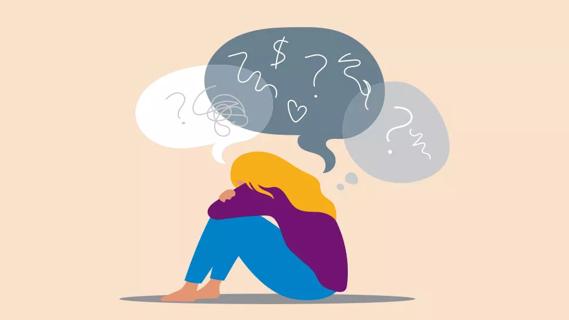This supplement may help with regulating cortisol levels, which may help with stress

If you’ve ever struggled with anxiety, your search for relief may have taken you to some interesting places. But has it ever taken you to the periodic table?
“Magnesium is an essential element that our body needs,” says psychiatrist Joseph Austerman, DO. “It’s the key to multiple biologic processes like cell functioning and energy utilization.”
Advertisement
Cleveland Clinic is a non-profit academic medical center. Advertising on our site helps support our mission. We do not endorse non-Cleveland Clinic products or services. Policy
As a supplement, some scientific evidence shows that it can help reduce your risk for high blood pressure. It also may help manage blood sugar levels for people with Type 2 diabetes. And there have been studies looking into the benefits of magnesium for everything from migraine treatment to COVID-19, which have shown to be helpful in some cases.
But when it comes to mental health, could magnesium really help reduce anxiety? From a neurological standpoint, there’s some evidence to suggest magnesium can be beneficial for managing anxiety and stress — though more research is needed.
Before you consider taking it, here’s what you should know when it comes to magnesium and anxiety.
Among other things, magnesium has been shown to help with anxiety in various ways. But before we get into the details, it’s important to remember that supplements like magnesium aren’t suitable replacement for professional medical care. That’s why it’s important to talk to your doctor about your anxiety and what other steps you should be taking to manage your symptoms, as other therapies can be more effective than magnesium.
Here’s what we know so far about magnesium and how it may help with anxiety:
First, magnesium has been shown to help with leveling out your cortisol — one of the stress hormones in your body. “Cortisol is very important for acute stress, but in times of chronic stress, it can actually worsen depression and anxiety,” warns Dr. Austerman.
Advertisement
In other words, too much stress, and therefore, cortisol, can magnify your anxiety. Many studies have explored the effect that magnesium has on reducing cortisol levels. Magnesium can tackle this excessive anxiety by diminishing or blocking the neuroendocrine pathways that send cortisol to your brain.
In addition, magnesium can help with regulating overwhelmed neurotransmitters in your brain. Neurotransmitters serve as the on and off switches of the brain — when you get stressed or anxious, they flip on, and when you calm back down, they turn off.
“When too many of your switches are on, your nerves are hyper-excited, so you feel anxious and you can even feel depressed, especially in the emotional control centers of our brain,” Dr. Austerman explains. Your brain keeps these on-and-off switches balanced by having two types of neurotransmitters: the first excites the nerves (excitatory), while the other inhibits, or blocks them (inhibitory).
“The on switches are the neurochemical called glutamate,” he continues. “And the off switch — or the thing that turns some of these nerves off — is a neurochemical called gamma-aminobutyric acid (GABA), which is also the anxiety pathway.”
Magnesium can help with keeping our neurotransmitters from over-firing and making anxiety worse. According to Dr. Austerman, it does this by blunting the release of glutamate — the excitatory neurotransmitter — and helping release GABA, the inhibitory neurotransmitter.
“In some ways, magnesium can mimic what some of our anxiety medications do,” he says.
Finally, there’s also something to be said about magnesium deficiency and how, for some people, taking these supplements could fill in a nutritional gap.
“We know from studies done 10 to 15 years ago that about 70% of Americans are magnesium deficient,” says Dr. Austerman. “So, this is a pretty common thing that we see. And we’ve seen that when you give magnesium to people, especially with mild anxiety, they tend to get better.”
So, it may be possible that you could have a deficiency that’s contributing to your anxiety. It’s important to discuss this with your healthcare provider to know for sure.
If you’ve ever browsed the rows and rows of shelves of supplements at the store, you’ve likely noticed that magnesium actually comes in a lot of different varieties. This is because some magnesium supplements are combined with other substances to either improve their efficiency or help the body absorb them better. Is there a specific formula you should look for?
Unfortunately, we just don’t know. Dr. Austerman notes that there hasn’t been any research yet looking at how well specific magnesium compounds work for treating anxiety.
Advertisement
“Currently, there is no uniform study where they use the same type of magnesium and replicate it in another study,” he says.
If you’re shopping around for magnesium, here are some common types that are usually recommended for anxiety:
Before trying a supplement, try to meet your daily magnesium needs naturally from foods. Your body is better able to absorb nutrients from food sources versus supplements, so aim to increase your intake of magnesium-rich foods such as nuts, legumes, whole grains, low-fat dairy and leafy greens.
This form of magnesium supplement is bound to citric acid and is often used as a laxative. According to Dr. Austerman, it’s the most commonly available type of magnesium you can find over the counter.
This is a form of magnesium that’s bound to the amino acid glycine, which is found naturally in protein-rich foods like fish, dairy and meat. A 2017 review found that glycine can improve sleep, reduce inflammation and help manage metabolic disorders such as diabetes. Along with those reasons, this type of magnesium is often recommended for anxiety because it’s well-absorbed and may help reduce stress levels.
This form of magnesium is relatively new. According to a 2013 review, it can be easily absorbed and does a good job of increasing magnesium levels in the brain. A 2022 study also found that a magnesium l-threonate-based formula helped improve cognitive function and mental clarity.
Advertisement
Especially with supplements, it’s important to understand the amounts you’re taking and how much is too much. It’s possible to experience symptoms of too much magnesium in the body from supplementation.
Some of these symptoms can include:
So, your next question may be: How much magnesium should I take?
First things first, if you’re considering trying out this supplement for your anxiety, you should talk to your healthcare provider to make sure it’s right for you and to make sure you’re taking the right amount.
For normal intake, the National Institute of Health generally recommends different guidelines based on your sex recorded at birth:
| Age | Men | Women |
|---|---|---|
| Birth to 6 months | 30 mg | 30 mg |
| 7–12 months | 75 mg | 75 mg |
| 1–3 years | 80 mg | 80 mg |
| 4–8 years | 130 mg | 130 mg |
| 9–13 years | 240 mg | 240 mg |
| 14–18 years | 410 mg | 360 mg |
| 19–30 years | 400 mg | 310 mg |
| 31–50 years | 420 mg | 320 mg |
| 51+ years | 420 mg | 320 mg |
| Age | ||
| Birth to 6 months | ||
| Men | ||
| 30 mg | ||
| Women | ||
| 30 mg | ||
| 7–12 months | ||
| Men | ||
| 75 mg | ||
| Women | ||
| 75 mg | ||
| 1–3 years | ||
| Men | ||
| 80 mg | ||
| Women | ||
| 80 mg | ||
| 4–8 years | ||
| Men | ||
| 130 mg | ||
| Women | ||
| 130 mg | ||
| 9–13 years | ||
| Men | ||
| 240 mg | ||
| Women | ||
| 240 mg | ||
| 14–18 years | ||
| Men | ||
| 410 mg | ||
| Women | ||
| 360 mg | ||
| 19–30 years | ||
| Men | ||
| 400 mg | ||
| Women | ||
| 310 mg | ||
| 31–50 years | ||
| Men | ||
| 420 mg | ||
| Women | ||
| 320 mg | ||
| 51+ years | ||
| Men | ||
| 420 mg | ||
| Women | ||
| 320 mg |
If you’ve been living with anxiety, one of the first steps is to talk to your healthcare provider to figure out a care plan that fits you best. Treating different types of anxiety can involve everything from talk therapy to prescription medications.
“If you’ve been supplementing for about a month, and you’re not seeing any difference, then it’s time to look at something different,” says Dr. Austerman.
While magnesium supplements may be helpful for some people with anxiety, they aren’t a substitute for professional medical care. If you’re experiencing symptoms of anxiety, it’s important to speak with your healthcare provider to determine the best course of treatment for your individual needs.
Advertisement
Learn more about our editorial process.
Advertisement

Going home isn’t always easy, but there are ways to ease any stress you might feel

Managing stress can help you sleep more soundly

This fast-acting anxiety medication should never be taken with alcohol, despite what you may see on The White Lotus

Deep breathing, positive mantras and tackling negative thoughts can help get you out of your head and cool down your anxiety

Focusing on what you can see, feel, touch and hear can help you feel more present in the moment

Performance anxiety and stage fright are outsized stress responses that can creep up when you’re put on the spot

A healthy amount of anxiety can keep you safe from harm and motivate you to take action

Although different conditions, they can occur together or cause one another

The tropical fruit is a good source of antioxidants and vitamin C

Most people fall asleep within 10 to 20 minutes, but if your experience is different, adjusting your sleep schedule may help

Exploring your hidden side can lead to better understanding of what makes you tick